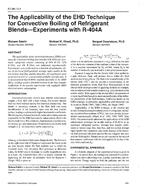The evolution of residential kitchen ventilation is examined and the importance of kitchen range hoods in today’s ventilation systems is reviewed as an aid to the specifying engineer. Home cooking produces liquid and solid particles, odours, airborne moisture, heat, and sometimes gas combustion products. How the residential range hood handles problems is revealed, and the results of various testing programmes are given. The proper application of range hoods relative to sizing, room location, and proper ductwork is discussed. The rating methods and standards for hoods are explained and related to real life. The issues of range hood noise and energy conservation are reviewed and answers are provided on how to handle these issues. Current standards and codes dealing with kitchen ventilation are reviewed. The future of kitchen ventilation in home construction is predicted and discussed.
KEYWORDS: domestic, kitchens, ventilation, engineers, specifying, exhaust hoods, particles, odour, moisture, heat, combustion gases, gas, testing, performance, sizing, location, ducts, standards, rating, noise, energy conservation
Citation: ASHRAE Trans. 1992, vol.98, Part 1, Paper number AN-92-16-1, 1187-1198, 11 figs., 9 refs.
Product Details
- Published:
- 1992
- File Size:
- 1 file , 1.2 MB
- Product Code(s):
- D-18111


